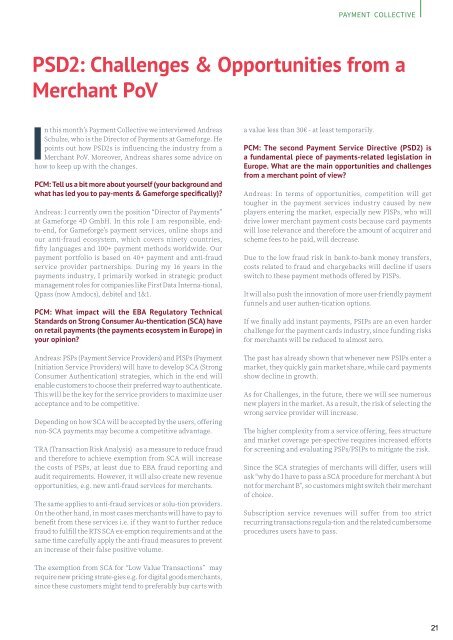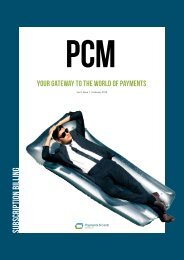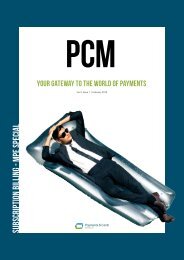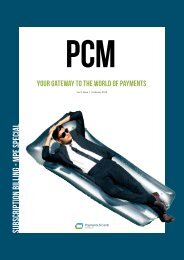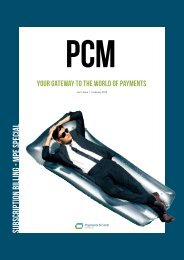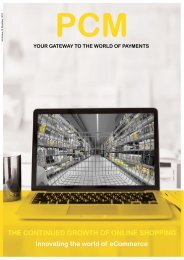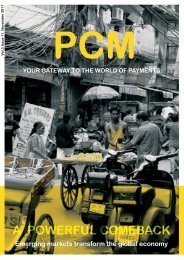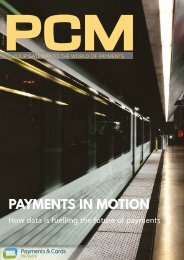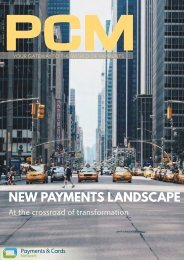PCM vol. 3 Issue 9
The September issue is focused on Regulations and Compliance with a great emphasis on PSD2. Payments and FinTech point of views from Retailers and Payment Service Providers.
The September issue is focused on Regulations and Compliance with a great emphasis on PSD2. Payments and FinTech point of views from Retailers and Payment Service Providers.
Create successful ePaper yourself
Turn your PDF publications into a flip-book with our unique Google optimized e-Paper software.
PAYMENT COLLECTIVE<br />
PSD2: Challenges & Opportunities from a<br />
Merchant PoV<br />
In this month’s Payment Collective we interviewed Andreas<br />
Schulze, who is the Director of Payments at Gameforge. He<br />
points out how PSD2s is influencing the industry from a<br />
Merchant PoV. Moreover, Andreas shares some advice on<br />
how to keep up with the changes.<br />
<strong>PCM</strong>: Tell us a bit more about yourself (your background and<br />
what has led you to pay-ments & Gameforge specifically)?<br />
Andreas: I currently own the position “Director of Payments”<br />
at Gameforge 4D GmbH. In this role I am responsible, endto-end,<br />
for Gameforge’s payment services, online shops and<br />
our anti-fraud ecosystem, which covers ninety countries,<br />
fifty languages and 100+ payment methods worldwide. Our<br />
payment portfolio is based on 40+ payment and anti-fraud<br />
service provider partnerships. During my 16 years in the<br />
payments industry, I primarily worked in strategic product<br />
management roles for companies like First Data Interna-tional,<br />
Qpass (now Amdocs), debitel and 1&1.<br />
<strong>PCM</strong>: What impact will the EBA Regulatory Technical<br />
Standards on Strong Consumer Au-thentication (SCA) have<br />
on retail payments (the payments ecosystem in Europe) in<br />
your opinion?<br />
Andreas: PSPs (Payment Service Providers) and PISPs (Payment<br />
Initiation Service Providers) will have to develop SCA (Strong<br />
Consumer Authentication) strategies, which in the end will<br />
enable customers to choose their preferred way to authenticate.<br />
This will be the key for the service providers to maximize user<br />
acceptance and to be competitive.<br />
Depending on how SCA will be accepted by the users, offering<br />
non-SCA payments may become a competitive advantage.<br />
TRA (Transaction Risk Analysis) as a measure to reduce fraud<br />
and therefore to achieve exemption from SCA will increase<br />
the costs of PSPs, at least due to EBA fraud reporting and<br />
audit requirements. However, it will also create new revenue<br />
opportunities, e.g. new anti-fraud services for merchants.<br />
The same applies to anti-fraud services or solu-tion providers.<br />
On the other hand, in most cases merchants will have to pay to<br />
benefit from these services i.e. if they want to further reduce<br />
fraud to fulfill the RTS SCA ex-emption requirements and at the<br />
same time carefully apply the anti-fraud measures to prevent<br />
an increase of their false positive <strong>vol</strong>ume.<br />
a value less than 30€ - at least temporarily.<br />
<strong>PCM</strong>: The second Payment Service Directive (PSD2) is<br />
a fundamental piece of payments-related legislation in<br />
Europe. What are the main opportunities and challenges<br />
from a merchant point of view?<br />
Andreas: In terms of opportunities, competition will get<br />
tougher in the payment services industry caused by new<br />
players entering the market, especially new PISPs, who will<br />
drive lower merchant payment costs because card payments<br />
will lose relevance and therefore the amount of acquirer and<br />
scheme fees to be paid, will decrease.<br />
Due to the low fraud risk in bank-to-bank money transfers,<br />
costs related to fraud and chargebacks will decline if users<br />
switch to these payment methods offered by PISPs.<br />
It will also push the innovation of more user-friendly payment<br />
funnels and user authen-tication options.<br />
If we finally add instant payments, PSIPs are an even harder<br />
challenge for the payment cards industry, since funding risks<br />
for merchants will be reduced to almost zero.<br />
The past has already shown that whenever new PSIPs enter a<br />
market, they quickly gain market share, while card payments<br />
show decline in growth.<br />
As for Challenges, in the future, there we will see numerous<br />
new players in the market. As a result, the risk of selecting the<br />
wrong service provider will increase.<br />
The higher complexity from a service offering, fees structure<br />
and market coverage per-spective requires increased efforts<br />
for screening and evaluating PSPs/PSIPs to mitigate the risk.<br />
Since the SCA strategies of merchants will differ, users will<br />
ask “why do I have to pass a SCA procedure for merchant A but<br />
not for merchant B”, so customers might switch their merchant<br />
of choice.<br />
Subscription service revenues will suffer from too strict<br />
recurring transactions regula-tion and the related cumbersome<br />
procedures users have to pass.<br />
The exemption from SCA for “Low Value Transactions” may<br />
require new pricing strate-gies e.g. for digital goods merchants,<br />
since these customers might tend to preferably buy carts with<br />
21


